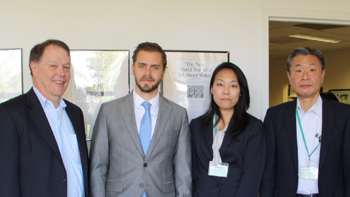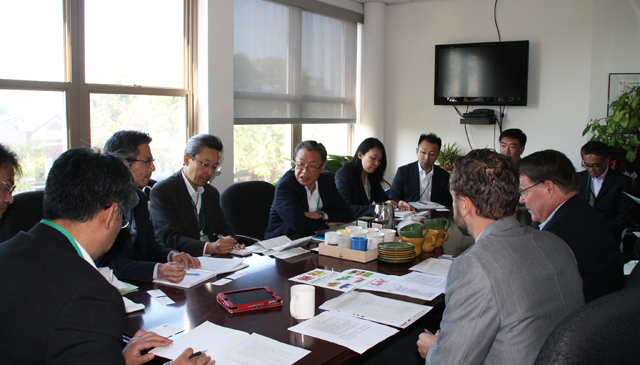Visits Center for Food Safety in Washington DC
Seikatsu Club Visits Center for Food Safety in Washington DC
Growing Demand for GM Food Labeling in the United States
Seikatsu Club Consumers' Cooperative Union (SCCCU) sent a delegation to the United States from October 4 to 12 and signed an agreement for a long-term supply of non-GM corn.
During the tour, on October 6, the delegation visited the Center for Food Safety (CFS), located about a ten-minute drive from the White House in Washington DC. CFS is a civil society organization with 500,000 members across the States and has played a leading role in lobbying both the federal and state governments to formulate GM labeling laws.
GM Food Labeling at Last in the United States!
Oregon Ballot Initiative
Ballot initiatives were voted on in many states on November 4 in concurrence with the midterm election. In Oregon and Colorado, people voted on whether or not mandatory labeling of genetically modified food (GM labeling) should be introduced in their states.
While the initiative was defeated in Colorado, it is still possible that Oregon Measure 92 could win. As of December 8, when 95% of the votes were counted, 752,720 votes (50%) were in favor of introducing GM labeling while 753,537 (50%) were against such labeling, according to the state website. (*Later in December, the measure was narrowly defeated. It was initially defeated by a mere 802 votes. A recount was held, as the margin of defeat was less than the 0.2 percent margin that automatically triggers a recount under Oregon law.)
Vermont GM labeling Entering into Force in 2016
What Does it Mean?
Already in Vermont, a GM labeling law passed at the state level in May 2014, and will be enacted in July 2016. It will introduce the first mandatory labeling of GMOs in the United States.
The law will be in effect only in Vermont, but it may be influential from coast to coast. Products with GM labeling following the Vermont labeling law will probably be seen in other states because food companies with a nationwide market are unlikely to segregate and label products only for Vermont, which would be very inefficient and unrealistic.
We have already seen a similar case in Japan. In 2008, food poisoning caused by frozen Chinese-made dumplings triggered Tokyo metropolitan government to enforce country-of-origin labeling under the “Tokyo Ordinance on Consumer Affairs”. As a result, labeling on almost all the frozen food produced and distributed in Japan was improved to bring it into line with the Tokyo ordinance.
The Vermont GM Labeling Law is a clear sign showing that more states should follow this example. The Grocery Manufacturers Association, whose members include the biggest biotech company Monsanto, sued Vermont State last August claiming that they will be damaged by the law. This case clearly indicates the potential impact of the Vermont Law. The Vermont state government is now preparing to enact the law while building up a fund to fight the lawsuit.
Prior to the Vermont Law, the neighboring states of Maine and Connecticut passed GM labeling laws with the condition that they will come into force only after other surrounding states have introduced similar labeling laws. These states will probably enact State Laws when Vermont finally enacts the law in spite of the legal attack by Monsanto and other biotech companies.
Further Collaboration with the Center for Food Safety
 At CFS, the delegation was welcomed by Mr. Jaydee Hanson, Director of Operations, and Mr. Colin O'Neil, Director of Government Affairs. The delegation and CFS officials shared information on the situation of GM food labeling in both countries, consumer attitudes toward GMOs and so on. Everyone agreed that further collaboration was needed on the issues. CFS worked with over 60 organizations to invite people to sign on to the petition requesting the federal government to label GMOs. As a result, more than 1.4 million people signed up. The federal government and congress, however, did not seem to be willing to change the current labeling rule. CFS then changed its strategy to lobby at the state level.
At CFS, the delegation was welcomed by Mr. Jaydee Hanson, Director of Operations, and Mr. Colin O'Neil, Director of Government Affairs. The delegation and CFS officials shared information on the situation of GM food labeling in both countries, consumer attitudes toward GMOs and so on. Everyone agreed that further collaboration was needed on the issues. CFS worked with over 60 organizations to invite people to sign on to the petition requesting the federal government to label GMOs. As a result, more than 1.4 million people signed up. The federal government and congress, however, did not seem to be willing to change the current labeling rule. CFS then changed its strategy to lobby at the state level.
Mr. Hanson and Mr. O’Neil told the delegation the following points:
- Both the ballot initiatives in California in 2012 and Washington in 2013 were narrowly defeated by 49% to 51%. The initiatives were meaningful because it became clearly apparent that almost half the voters support GM labeling.
- Opponents of GM labeling, most of whom are big companies, broadcast TV ads against the labeling initiatives. The industry spent USD46 million in California in 2012 and USD22 million in Washington in 2013.
- Those TV ads said “Families can expect to pay $400 more in grocery costs each year if Measure 92 passes,” “Measure 92 exempts thousands of products produced with GMOs, for example meat and dairy products from animals raised on GMO feeds, and alcoholic beverages”. Oregon state government estimates each consumer would only pay less than 1 cent per day to cover the cost of GM labeling.
- GM labeling bills were also introduced in the states of New York, Massachusetts, and New Jersey.
- While more and more federal senate and house members support GM labeling, a so-called “Denying Americans the Right-to-Know Act” (DARK Act) bill, designed to block the mandatory labeling of GM foods, was proposed by a congressman who is backed by the food industry including Monsanto. CFS is keeping an eye on it.
- As a part of its activities to promote the non-GM movement in the United States, CFS has been pressuring companies and brands such as Starbucks and Cherrios to eliminate GM ingredients or voluntarily label GMOs. CFS also works to bring consumers’ demands to food companies. “Just Label It” is a network of food-related business entities, consumers, farmers, civil society organizations launched in 2011. CFS is one of over six hundred partner organizations of the network.。

生活クラブをはじめませんか?
42万人が選ぶ安心食材の宅配生協です
ウェブ加入限定 無料プレゼント






